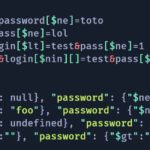No products in the cart.

Victoria Walters and Yu Cai, Michigan Technological University The progress we've seen in Artificial Intelligence (AI) over recent years has been truly remarkable. Generative, cognitive, and conversational AI have found extensive applications and are already in widespread use. As we explore the integration of AI into penetration testing, utilizing tools....
Author
Latest Articles
 BlogDecember 28, 2022Cybersecurity in Education: What Parents, Teachers, and Students Should Know in 2023
BlogDecember 28, 2022Cybersecurity in Education: What Parents, Teachers, and Students Should Know in 2023 BlogDecember 15, 2022Remembering Leonard Jacobs
BlogDecember 15, 2022Remembering Leonard Jacobs BlogSeptember 30, 2022VPN Security: A Pentester's Guide to VPN Vulnerabilities
BlogSeptember 30, 2022VPN Security: A Pentester's Guide to VPN Vulnerabilities BlogAugust 9, 2022AppSec Tales II | Sign-in
BlogAugust 9, 2022AppSec Tales II | Sign-in
Subscribe
Login
0 Comments
